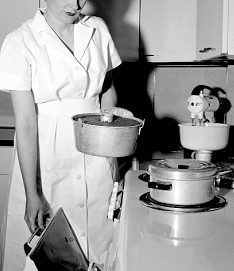How A Chicana Finally Learned To Cook
 When I was an adolescent, my mom tried teaching me how to cook and clean. I was an obnoxiously rebellious girl at the time, so I usually refused. Here are a few things that I said or that would run through my mind:
When I was an adolescent, my mom tried teaching me how to cook and clean. I was an obnoxiously rebellious girl at the time, so I usually refused. Here are a few things that I said or that would run through my mind:
- “Cooking makes me feel like a slave!”
- “Howcome my brother doesn’t have to learn?!”
- “This is un-feminist!”
- “I’m not going to be some submissive Mexican housewife!”
I was also really bothered by my mom’s hovering while I tried to cook something. I remember I once tried helping my aunts and mom make tamales for Christmas, and when they all complained that I was making the tamales “muy gordos,” I threw my spoon on the table and left in a huff.
When I was 21, I moved out of my parents’ house and moved in with my friend. Together, we were dreadfully poor. I was a senior in college and was living off of very low student work wages. That year we ate a lot of eggs, pancakes, potatoes, and imitation crab meat (why? I’m not quite sure). That was the first time I really had to cook for myself and I failed…a lot. I once tried to make patties out of ground chicken, and I was so disgusted by them that I threw them out, which was unheard of for me because I never wasted anything. It tasted as though the chicken were regurgitated, then mixed with foot flavoring. That year, however, I did learn some basic Mexican recipes with the help of my mother. With me moving out, my relationship with her had improved, I was also much less of a brat. And, with that, I successfully made pozole, frijoles, and mole. Sometimes I threw dinner parties to show off my new skills.
Then when I moved to Spain, where many of the ingredients were unfamiliar. I was so intimidated by the food at times that I often just ate tortilla española. I think they even gave me “empacho” and I haven’t eaten one since. As I grew more comfortable in my city of Madrid, I became a bit more adventurous with my cooking. I made delightful soups, salads, and even Indian food. And thanks to the tortillas and chiles my mom sent over, I was able to make chilaquiles for my friends, which delighted them because it was very difficult to find good Mexican food in Spain. I also taught my roommate how to make arroz con leche as well as how to throw a good meal together with the scraps in the fridge. I was proud to be able to give people joy through food and I had my mom to thank for that.
I went to grad school in Albuquerque, which for young person can be a bit dull, so I spent a lot of my time honing my cooking skills. I called my mother all the time to get recipes and advice. I also had a new boyfriend who I was trying to impress. He must have been really special for me to makes chiles rellenos in our first few weeks together — they are really hard to make, and I always end up with a sore back and oil splattered all over me.
Now that I’m no longer a teenaged brat, I know that cooking doesn’t have to be oppressive. In fact, it’s empowering to be able to feed people. There are times that I will eat my mom’s enchiladas or my aunt’s mole and I feel like a total failure. I think, I will never be this good. It’s the same feeling I get l when I read an amazing poem. I fluctuate between feelings of pride and inadequacy: “These tacos are excellent! No, they are garbage. No, they actually tasty. No, they are abominations. Alright, they are mediocre.” But that’s how I decided to live my life, which is the life of any artist, I suppose — constantly dissatisfied, always struggling towards transcendence.
[Photo By Seattle Municipal Archives]
